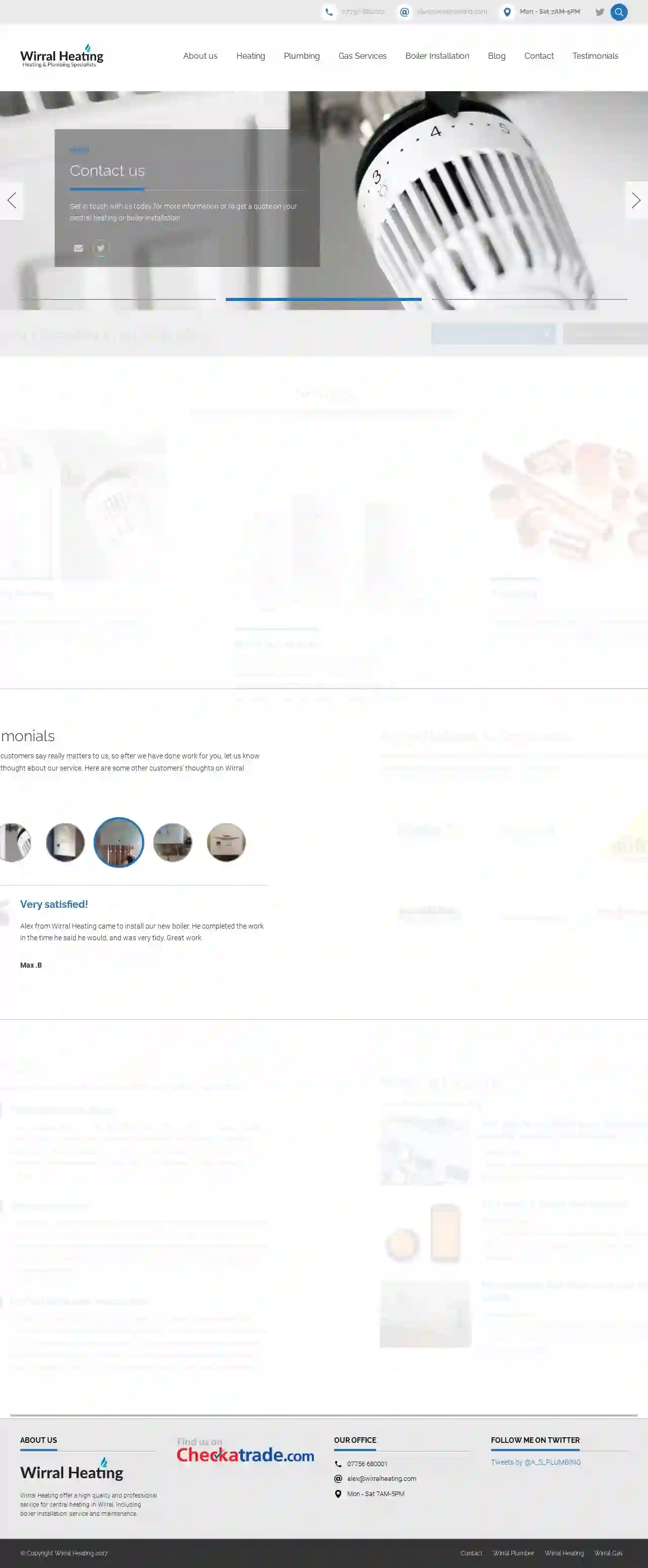Emergency HVAC Wallasey
Best Emergency HVAC in Wallasey
Receive multiple Emergency AC Repair quotes for your project today! Compare profiles, reviews, accreditations, portfolio, etc... and choose the best offer.
- Ra
Rapid Plumbing & Heating
4.725 reviewsWallasey, GB- Services
- Why Us?
Get Quote - Ce
Centreline Fires
5182 reviewsWallasey, GB- Services
- Why Us?
Get Quote - Wi
Wirral Gas
4.855 reviewsWallasey, GB- Services
- Why Us?
Get Quote - El
Electromart - Appliance Repairs and Spares
4.538 reviewsWallasey, GB- Services
- Why Us?
Get Quote 
Wirral Heating LTD
4.821 reviewsEastham Village Road, The Spinney, Eastham, CH62 0AE, GBWirral Heating is a professional and experienced central heating engineer in Wirral, offering a range of services including boiler installation, service, and maintenance. With years of experience in plumbing and bathroom fitting, we pride ourselves on our high-quality work and customer satisfaction. As accredited boiler installers for Vaillant and Worcester, we ensure that our customers receive the best possible service and products. Our team of experts is dedicated to providing a prompt and efficient service, ensuring that our customers' homes are warm and comfortable all year round.
- Services
- Why Us?
- Accreditations
- Our Team
- Testimonials
- Gallery
Get Quote- A
A & S Heating & Gas Ltd
51 reviewsWallasey, GB- Services
- Why Us?
Get Quote - Sc
Screwfix Wallasey - Moreton
4.5281 reviewsWallasey, GB- Services
- Why Us?
Get Quote - Ro
Roberts
53 reviewsWallasey, GB- Services
- Why Us?
Get Quote - Al
Alan George Gas Fitting
51 reviewsWallasey, GB- Services
- Why Us?
Get Quote - Co
Corcoran Heating
515 reviewsWallasey, GB- Services
- Why Us?
Get Quote
Over 16,895+ HVAC Businesses onboarded
Our HVAC pros operate in Wallasey and beyond!
HVACCompaniesHub has curated and vetted Top HVAC Contractors near Wallasey. Find a top & trustworthy business today.
Frequently Asked Questions About Emergency HVAC Services
- No heat in freezing weather
- No air conditioning in extreme heat
- Gas leaks
- Carbon monoxide leaks
- Frozen pipes
- Water leaks from HVAC equipment
- Electrical problems with your system
- Insulate Pipes: Insulate exposed pipes in unheated areas, such as crawl spaces, attics, and garages.
- Seal Air Leaks: Seal air leaks and cracks in walls and foundations near pipes.
- Keep Thermostat Consistent: Maintain a consistent thermostat setting, even when you are away, to keep indoor temperatures above freezing.
- Open Cabinet Doors: Open cabinet doors under sinks to help prevent pipes from freezing.
- Let Faucets Drip: During freezing temperatures, allow cold water taps to drip slowly to relieve pressure and prevent pipes from bursting.
- Turn off the system: Switch off your HVAC system at the thermostat.
- Turn off the power: Locate the circuit breaker for your HVAC system and turn it off.
- Wait: Wait a few minutes for the system to completely power down.
- Restore power: Turn the circuit breaker back on.
- Turn on the system: Switch your HVAC system on at the thermostat.
What is considered an HVAC emergency?
How can I prevent frozen pipes in the winter?
How do I reset my HVAC system?
How do I find an emergency HVAC technician near me?
What is considered an HVAC emergency?
- No heat in freezing weather
- No air conditioning in extreme heat
- Gas leaks
- Carbon monoxide leaks
- Frozen pipes
- Water leaks from HVAC equipment
- Electrical problems with your system
How can I prevent frozen pipes in the winter?
- Insulate Pipes: Insulate exposed pipes in unheated areas, such as crawl spaces, attics, and garages.
- Seal Air Leaks: Seal air leaks and cracks in walls and foundations near pipes.
- Keep Thermostat Consistent: Maintain a consistent thermostat setting, even when you are away, to keep indoor temperatures above freezing.
- Open Cabinet Doors: Open cabinet doors under sinks to allow warmer air to circulate around pipes.
- Let Faucets Drip: During extremely cold weather, allow cold water taps to drip slowly to relieve pressure and prevent pipes from bursting.
How do I reset my HVAC system?
- Turn off the system: Switch off your HVAC system at the thermostat.
- Turn off the power: Locate the circuit breaker for your HVAC system and turn it off.
- Wait: Wait at least 5 minutes for the system to completely power down.
- Restore power: Turn the circuit breaker back on.
- Turn on the system: Switch your HVAC system on at the thermostat.